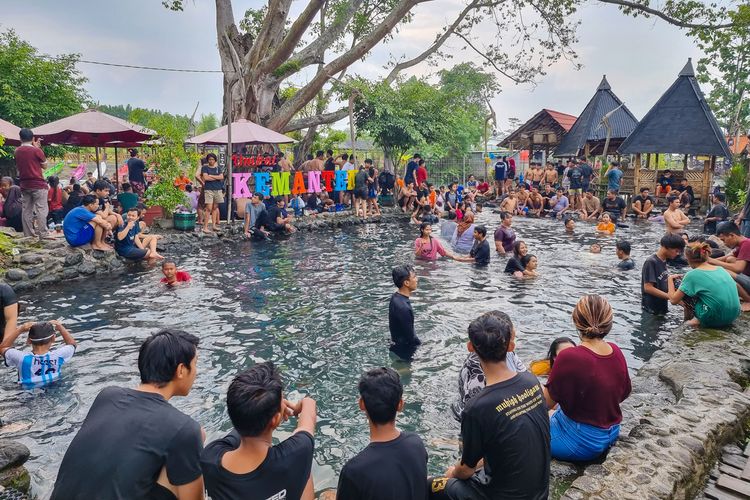Sojiwan Temple Tourism: Perhaps not many people have heard of it, especially when asked where it is located. Indeed, Sojiwan Temple is not as well-known as Prambanan Temple, let alone Borobudur Temple. It's actually not far from Prambanan Temple, taking perhaps half an hour on foot. Recently restored in 2011, this temple is relatively new compared to the other temples. What's most striking about this temple is its similar shape to Prambanan: tall with a pyramid-like structure on top, but the upper part of the temple consists of stupas similar to those at Borobudur. It could be said that this temple is like a "marriage" between Prambanan and Borobudur. This temple is situated within a fairly extensive complex with beautiful, well-maintained gardens. It turns out that this complex was only inaugurated after being restored in December 2011 by the Minister of Education and Culture, Mohammad Nuh. Initially, this temple was only a half-finished structure that looked like a ...
The tradition of Padusan before Ramadan is an ancestral heritage that is still carried out by the Javanese community. Padusan was practiced by the community before Islam entered Java. During the Majapahit Kingdom, knights, poets, brahmins and masters often performed padusan to purify themselves. The tradition has survived until now, thanks to the role of Wali Songo who preached with a cultural approach. In general, the meaning of padusan is a bathing tradition that is usually carried out before Ramadan by Javanese people.
However, to understand further what is padusan and how to read the padusan intention and the procedure for doing it?
What is Padusan?
According to Retno Widyastutik's research in the publication of Surakarta State University (UNS), padusan comes from the word adus which means bathing. The padusan tradition is carried out the day before Ramadan, precisely from noon to evening. When carrying out the padusan tradition, Javanese people will generally bathe or soak in spring water. The purpose of padusan is to clean themselves, both physically and mentally, before the holy month of Ramadan arrives. The padusan tradition cannot be separated from Ruwahan. Ruwahan comes from the word Ruwah, the 8th month in the Javanese calendar, or the month that falls before Ramadan.
Padusan in Islam itself, there is actually no evidence that requires people to take a big bath on the day before Ramadan. However, Islam also does not prohibit its adherents from cleaning themselves.
Padusan locations in Indonesia Padusan locations ahead of Ramadhan can be found in several places in Indonesia, especially in Central Java and Yogyakarta. Areas that have natural hot springs or places that are centers of spiritual and religious activities are places that are usually frequented for padusan ahead of Ramadan in Indonesia. Some of them are:
1. DI Yogyakarta
Quoted from indonesia.go.id, one of the popular destinations for padusan is Umbul Pajangan on Kaliurang Street, Sleman, and Sendang Klangkapan in Klangkapan Hamlet, Margoluwih Village, Sleman.
Based on the story circulating, Sendang Klangkapan was made by Sunan Kalijaga in search of water for ablution, which makes this place thick with history. There is also Sendang Ngepas Lor in Donoharjo Village, Sleman.
2. Klaten
One of the natural springs named Umbul Manten, in Sidowayah Village, Polanharjo Sub-district, Klaten Regency, is always crowded before the fasting month by those who want to celebrate the padusan ritual. Some other springs in Klaten that are also the location of padusan include Cokro Spring Object (OMAC), Umbul Ponggok, and many more. Padusan at OMAC is usually carried out symbolically by the Klaten Regent who performs a watering of Mas and Mbak Klaten (Klaten Regency Tourism Ambassador), then continued by the residents.
3. Semarang
Padusan activities in Semarang are usually carried out at Umbul Petilasan Joko Tingkir, Semarang. Thousands of people not only from Semarang but also from surrounding areas such as Salatiga, come to this petilasan to undergo padusan. Here, the padusan location is divided into two, namely Sendang Lanang and Sendang Puteri.
4. Tegal
Located in Tegal, Central Java, Air Panas Guci is often used as a padusan destination before entering the month of Ramadan.
5. Bogor
Gunung Pancar located in Sentul, Bogor, West Java, has a natural hot spring that is often used as a padusan place before entering the month of Ramadan. In addition to Gunung Panas, Ciseeng hot spring located in Bogor Regency, West Java is also often used as a place for padusan ahead of Ramadan by the surrounding community.
6. Kediri
Sumber Maron is located in Kediri, East Java. This location is a place that is often visited for padusan ahead of Ramadan.
7. Bali
In Bali there is a hot spring named Tirta Sanita Hot Springs located in Tabanan, Bali which is also a place of choice for people to do padusan ahead of Ramadan.
The locations of padusan ahead of Ramadan in Indonesia above are just a few examples, there are still many other places in various regions that are also often used for this purpose. But make sure to check the latest information before visiting these places.

Comments